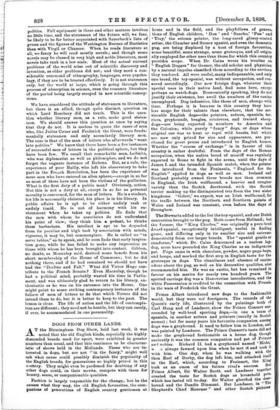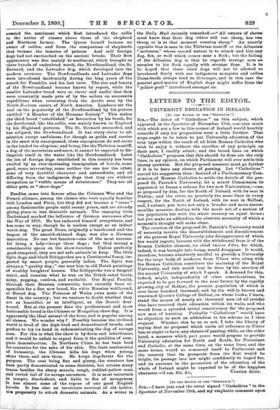AT the Birmingham Dog Show, held last week, it was
was painted by Landseer. The Prince Consort's taste did not noted that the old English kinds, especially the highly make the greyhound fashionable as a house dog, though descended breeds used for sport, were exhibited in greater anciently it was the common companion and pet of Princes numbers than usual, and that this continues to be character- and nobles. Richard IL had a greyhound named Mithe,,
istio of shows held in the Midlands. Those who are in- w. always fawned upon him when he met it and took it terested in dogs, but are not " in the fancy," might well
ask what cause could possibly diminish the popularity of with him. One day, when he was walking with the then Earl of Derby, the dog left him, and attached itself
other dogs could, on their merits, compete with them for Prince Albert, Sir Walter Scott, and Landseer together
beauty, sense, or companionable qualities. created the taste for Scotch dogs as household pots, which has lasted till to-day. Sir Walter glorified the deer•
causes what they may, the old English favourites, the com- hound and the Dandle Dinmont. But Landseer, The Fashion is largely responsible for the change; but be the
politics. Full equipment in these and other matters involves home and in the field, and the playfellows of genera. no little time, and the statesman of the future will, we fear, tions of English children, Don ' and Sancho," Pan ' and be likely to be far better acquainted with Sauerbeck's lists of ' Tray,' the solemn pointer, the long-eared glossy-coated prices and the figures of the Washington Bureau of Statistics setter, the Clumber and Sasser spaniel, and even the domestic than with Virgil or Chaucer. When he reads literature at pug, are being displaced by a host of foreign favourites, all, we fancy he will read mostly novels ; and though some some beautiful, some strange, some grotesque, and all origin. novels may be classed in very high and noble literature, most ally employed for other uses than those for which this country novels take rank in a low scale. Most of the actual current provides scope. When Dr. Gains wrote his treatise on problems of the world arise out of scientific discovery and " English Dogges " for Gesner, the old scholar and physician invention, as older problems did not ; and they need a con. by a natural impulse classified them according to the services siderable command of ethnography, languages, even psycho- they rendered. All were usef al, many indispensable, and only logy, if they are to be treated effectively. It is not statesmen one breed, the toy-spaniel, was without occupation, and cell. only, but the world at large, which is going through this cured accordingly. Our new foreign dogs, whatever their process of absorption in science, even the romance literature special uses in their native land, find none here, except of the period being largely steeped in new scientific concep- perhaps as watch-dogs. Economically speaking, they do not tions. justify their existence, but swell the numbers of the canine We have considered the attitude of statesmen to literature, unemployed. Dog industries, like those of men, change with but there is an allied, though quite distinct, question on time. Perhaps it is because in this country they have less scope for their talents than elsewhere, that the ser. tion whether literary men, as a rule, make good states- tion English dogs—the pointers, setters, spaniels, ter- men. We should answer this question at once by saying riers, greyhounds, beagles, retrievers, and trained sheep. that they do not. It is useless to quote the cases of men dogs—are being exported in numbers to America and who, like Julius Cmsar and Frederick the Great, were funda-
the Colonies; while purely " fancy " dogs, or dogs whose mentally statesmen and only secondarily literary men. original use was to hunt or repel wild beasts, but which The case is that of the man of letters who afterwards " went are now only prized for size and appearance, are put- into politics." We know that there have been a few instances chased for great prices and introduced to English homes. " " of successful men of letters in the political sphere, but they Whether the course of exchange is in favour of this have been few. We recall that remarkable man, Leibnitz, country is rather doubtful. From the days of the Roman o who was diplomatist as well as philosopher, and we do not occupation, when the native breed of mastiff was regularly forget the cognate instance of Rubens. But, as a rule, the exported to Rome to fight in the arena, until the days of experience of poor Bailly, who left his observatory to take James I. and the intended Spanish match, when the pointer " part in the Freach Revolution, has been the experience of was introduced from the Peninsula, England for the most men who have entered an alien sphere,—except in so far English" applied to dogs as well as men. Ireland and as most of these have not been the victims of the guillotine. Scotland probably owned three breeds not then common What is the first duty of a public man P Obviously, action. in England, the Irish wolfhound, a heavier and rougher But this is not a duty at all, except in so far as personal variety than the Scotch deerhound, with the Scotch morality is concerned, for the man of letters. He is a student, terrier making up the distinguished trio from the two sister ' Wales and Ireland was constant, even before the days of spaniels, in another setters and pointers (usually in Scotch DOGS FROM OTHER LANDS. scenes) ; but for many years his favourite companion among dogs was a greyhound. It used to follow him in London, and
crested the sentiment which first introduced the collie to the notice of classes above those of the shepherd and Northern farmer. The Queen herself became an owner of collies, and from the companions of shepherds they became the inmates of palaces. And still foreign dogs had not encroached on the ancient breeds. Their first appearance was due mainly to sentiment, which brought us three breeds of undoubted worth, the Newfoundland, the St. Bernard, and the Labrador dog, which developed into the modern retriever. The Newfoundlands and Labrador dogs were introduced incidentally during the long years of the search for Franklin and his lost crew. The size and beauty of the Newfoundland became known by report, while the smaller Labrador breed were so clever and useful that they were constantly made pets of by the sailors on successive expeditions when returning from the Arctic seas by the North-E.istern coasts of North America. Landseer set the seal on the popularity of the Newfoundland by his picture entitled "A Member of the Humane Society." This makes the third breed "established" as favourites by his brush, for the deerhound, like the collie, was mainly known to England by his Highland pictures. The St. Bernard succeeded, and has eclipsed, the Newfoundland. It has every claim to ad- miration except usefulness, for though as guide and carrier in the snow it is unsurpassed, these emergencies do not occur in the land of its adoption; and being, like the Thibetan mastiff, a dog of the mountains and snow, it cannot be expected to dis- tinguish itself in the water like the Newfoundland. Later the list of foreign dogs established in this country has been swelled by an ever-increasing immigration of breeds, some good, some interesting, some neither the one nor the other, some of very doubtful character and antecedents, and all differing from the indigenous dogs that they are without occupation or "visible means of subsistence." They are all either pets, or " show-doge."
Poodles came into favour after the Crimean War and the french alliance, among the classes who were equally familiar with London and Paris, but they did not become a " craze " among fashionable people until recent years, and are already giving place to less desirable animals. The engaging little Dachshund marked the influence of German successes after the War of 1870. He has endeared himself everywhere, and las come to stay, though he is useless except as an indoor watch-dog. The great Dane, originally a boarhound and the largest of the smooth-skinned dogs, was also a German innovation. No one bat fanciers—one of the most success- ful being a lady—keeps these doge ; but they occupy a considerable space on the show-benches. Unless perfectly .good-tempered, they are not safe animals to keep. The little Spitz dogs and black Schipperkes are a Continental fancy, im- ported by smart people, generally ladies. The Spitz was always a "quality dog;" one sees him in old Dutch paintings of wealthy burghers' houses. The Schipperke was a bargees' watch, and remains what he was on the Dutch canal boats, noisy, yapping, restless, and excitable. Our Royal Family, through their Russian connection, have recently been re- aponsible for a fine new breed, the white Russian wolfhound, or Borzoi dog. The Princess of Wales owns some of the .finest in the country ; but we venture to doubt whether they are as beautiful, or as intelligent, as the Scotch deer hound. But at the present date the predominant and most _fashionable breed is the Chinese or Mongolian chow dog. It is apparently the ideal animal of the hour, and is popular among all classes. We wonder why ? Possibly because the civilised world is tired of the high-bred and domesticated breeds, and _prefers to try its hand in redomesticating the dog of savage man. For this is what the chow is by form and inheritance, and it would be unfair to expect from it the qualities of corn- -plete domestication. In Northern China he has been bred for centuries for the sake of his skin. The least sentimental of humanity, the Chinese kills his dogs when young, skins them, and eats them. He keeps dog-farms for the purpose. The coat being fine and glossy, the creature has been partly domesticated in some districts, but retains many traces besides the sharp muzzle, rough, reddish-yellow coat, and curled tail of its savage ancestors. It is most uncertain in temper, disobedient, and liable to fits of savageness, 1t has almost none of the repose of our good English breeds. It has also an inveterate survival of old habits. tie propensity to attack domestic animals. As a writer in the Daily Mail recently remarked :—" All owners of chows must know that their dog either will run sheep, has ran sheep, or is at that moment running sheep." An exactly opposite bias is seen in the Thibetan mastiff or the Albanian " molossus," whose second nature is to attack and bite any dog, fox, or wolf which comes near a flock ; but the failing of the Albanian dog is that he regards strange men as enemies to his flock equally with strange dogs. It is to be hoped that these chow dogs will not be allowed to interbreed freely with our indigenous mongrels and collie■ Cross-breds always tend to ill-temper, and in this case the general good nature of English dogs might suffer from the "yellow peril" introduced amongst us.























































 Previous page
Previous page